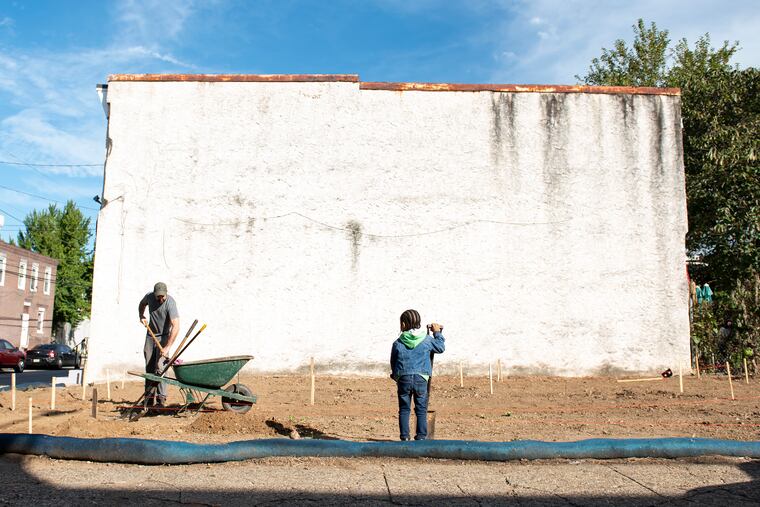Thomas Jefferson University professor’s idea for community-designed parks in Philly takes root
Volunteers in Mantua on Saturday began the process of turning a vacant lot into a park, the first in what a Thomas Jefferson University professor hopes will be a citywide effort to create community-designed open spaces.

It starts with dirt and a pile of gravel.
That’s how the future park in Mantua started Saturday morning, anyway.
But soon enough, volunteers hope, that assortment of soil and stone will be moved, shaped, massaged, and ultimately rearranged into something unique for the neighborhood: a park instead of a vacant lot, largely planned and built by residents.
“It’ll look so different,” said Gwen Morris, of the Mantua Civic Association, admiring as a small group of people including Kim Douglas, De’Wayne Drummond, and even 6-year-old Christopher Parnell Jr. used shovels and rakes to start grooming the land at the corner of 38th and Melon Streets into shape.
The idea sprouted from Douglas, a landscape architecture professor at Thomas Jefferson University, and is easy to grasp: Take a vacant lot in a community lacking green space and work with the community to transform it into a park.
The benefits can be wide-ranging; studies have credited beautifying green space with helping to reduce crime and lowering residents’ feelings of depression.
But Douglas and a colleague, Drew Harris, went a step further, seeking to create a program that could democratize and localize the process of building parks across the city by having residents help to plan, build, and maintain their own open spaces. They dubbed it “Park in a Truck,” the idea being that once the park is planned, all the materials will be dropped off in a truck for the volunteers to assemble.
“The Park in a Truck idea is simple: Give local residents the resources and training to design, build and maintain parks on unused land in their own neighborhoods,” Douglas and Harris wrote in April. “They decide whether it’s a place to grow vegetables, a setting to show off local art and culture, a space for child play, or simply a green place for rest and relaxation.”
There’s no truck yet, Douglas said in Mantua on Saturday morning, but the spirit of the idea persists.
Residents near Melon Street, for example, helped tweak a design template for the space by adding chess tables, emphasizing tree coverage, and including benches with armrests that can help elderly residents stand up more easily.
The 2,400-square-foot lot was donated by owner West Philadelphia Real Estate, Douglas said, and will border a future community center. Funding was provided by the Greenfield Foundation. Douglas estimated the cost at $24,000, which she said is significantly less costly per square foot than the typical cost to construct a park.
She hopes the Mantua project is the first of many. There are plans to build similar parks in the spring in Kensington, Kingsessing, and Southwest Philadelphia, Douglas said. Such local green-space efforts, she has said, support all three of the major priorities of City Council’s March report “Narrowing the Gap: Strategies to alleviate and prevent poverty in Philadelphia" without putting any maintenance responsibilities on city government.
Douglas believes the idea could easily scale by providing checklists and best practices for anyone seeking to help upgrade a vacant lot in their neighborhood. The city has tens of thousands of parcels that could qualify, she said.
She even has a name if the demand gets too big: Park in a Box. Everything anyone would need to take a lot from vacant to fully realized park.
Drummond, 39, who lives nearby, admitted Saturday that he was no construction expert. But as he shoveled dirt on the Melon Street parcel, he said he appreciated how involved the community had been in transforming a small slice of the neighborhood.
“This is about ownership,” Drummond said.